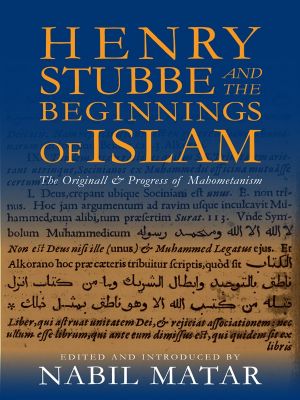Henry Stubbe and the Beginnings of Islam

- Authors
- Matar, Nabil
- Publisher
- Columbia University Press
- Tags
- lco003000 , history , religion , islam , classical and medieval , rel037010 , literary collections , ancient
- ISBN
- 9780231527361
- Date
- 2013-12-24T00:00:00+00:00
- Size
- 16.62 MB
- Lang
- en
Henry Stubbe (16321676) was a revolutionary English scholar who understood Islam as a monotheistic revelation in continuity with Judaism and Christianity. His major work, An Account of the Rise and Progress of Mahometanism, was the first English text to positively document the Prophet Muhammad's life, celebrate the Qur'an as a divine revelation, and praise the Muslim toleration of Christians, undermining a long legacy of European prejudice and hostility.Nabil Matar, a leading scholar of Islamic-Western relations, standardizes Stubbe's text and situates it within England's theological climate. He shows how, to draw a positive portrait of Muhammad, Stubbe embraced travelogues, early church histories, Arabic chronicles, Latin commentaries, and studies on Jewish customs and scriptures, produced in the language of Islam and in the midstof the Islamic polity.
Henry Stubbe (1632–1676) was a revolutionary English scholar who understood Islam as a monotheistic revelation in continuity with Judaism and Christianity. His major work, An Account of the Rise and Progress of Mahometanism, was the first English text to positively document the Prophet Muhammad’s life, celebrate the Qur’ān as a divine revelation, and praise the Muslim toleration of Christians, undermining a long legacy of European prejudice and hostility. Nabil Matar, a leading scholar of Islamic-Western relations, standardizes Stubbe’s text and situates it within England’s theological climate. He shows how, to draw a positive portrait of Muhammad, Stubbe embraced travelogues, early church histories, Arabic chronicles, Latin commentaries, and studies on Jewish customs and scriptures, produced in the language of Islam and in the midst of the Islamic polity.
Henry Stubbe (1632--1676) was a revolutionary English scholar who understood Islam as a monotheistic revelation in continuity with Judaism and Christianity. His major work, "An Account of the Rise and Progress of Mahometanism," was the first English text to positively document the Prophet Muhammad's life, celebrate the Qur'an as a divine revelation, and praise the Muslim toleration of Christians, undermining a long legacy of European prejudice and hostility.
Nabil Matar, a leading scholar of Islamic-Western relations, standardizes Stubbe's text and situates it within England's theological climate. He shows how, to draw a positive portrait of Muhammad, Stubbe embraced travelogues, early church histories, Arabic chronicles, Latin commentaries, and studies on Jewish customs and scriptures, produced in the language of Islam and in the midst of the Islamic polity.